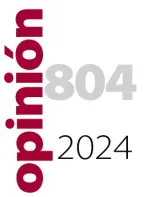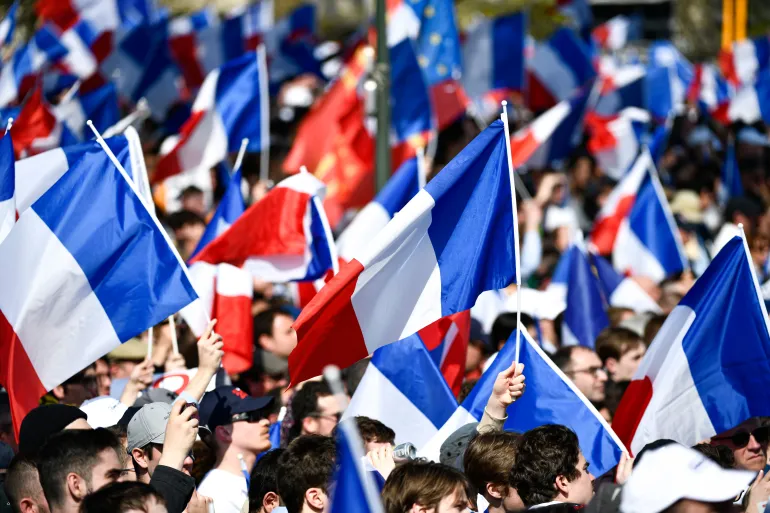Populism is sweeping France whoever wins the elections


French voters head to the ballot box on Sunday 30th June in the first round of a high-stakes parliamentary election. Three features of French politics, often overlooked, are crucial to understand the evolution of the vote in France: euroscepticism from French far right and far left; how populism is already part and parcel of everyday politics; and the power of hard right-wing media.
No sooner had the results of the European elections been announced on June 9, that the French president called a snap parliamentary election. His party Renaissance took a drubbing and the hard right Rassemblement National (RN) won its best ever result with 31.37% of the vote. Emmanuel Macron’s decision stunned millions of French people. Although Renaissance has not had a majority in parliament since 2022, a certain number of laws have been passed. France has been difficult to govern but not ungovernable but what exasperates many people is Mr. Macron’s alleged “narcissistic management”.
Two weeks later, the president’s gamble appears to have backfired. Instead of rallying his supporters in favour of moderate liberal democracy, it has succeeded in boosting extremes of left and right. Mr Macron has often dismissed the hard right and the hard left La France Insoumise (LFI), whose thinking dominates the hastily assembled alliance of left-wing parties le Nouveau Front Populaire (NFP), as birds of a feather. The leader of LFI, Jean-Luc Mélenchon returns the compliment, dismissing Le Pen’s fast rising number two, the 28 year old Jordan Bardella as a “worse version of Emmanuel Macron”. The RN is credited with well over thirty per cent of the vote in the first round of the elections due on 30th June while NFP is expected to come in second place. Macron’s centrist forces are trail in third position. Voters are expected to turn out in record numbers for a general election which makes forecasting the result exceptionally difficult.
Overlooked features of French politics
Two features of French politics are often overlooked by observers. The first is that the hard left and the hard right share a very sceptical, not to say hostile attitude towards the Brussels bureaucracy whose very DNA include the liberal economic policy which has been the hallmark of western industrialised countries since the 1980s. But whereas the RN has trimmed its economic sails in recent days, the NFP has promised to increase the basic wage and reimpose the wealth tax which the president cancelled in 2017. NFP refuses to accept that the world’s billionaires – not least the French ones, have increased their wealth by roughly 3 trillion Euros since the pandemic while the rest, whether poor or just managing have lost out. Many ordinary French people live in a state of permanent insecurity. The hard right is not, however, the one-trick pony it is often described as. Immigration is not its only obsession though it has stirred the pot of anti-Muslim, anti-north African for decades in its successful bid to gain support among left behind white males. Like the Left its world view pivots around the idea of nation and “French way of life” as the sacrosanct bedrock of everything.
After first winning the presidency in 2017 by uniting the centre right and the centre left under his new party, Emmanuel Macron turned to more right-wing policies. This is where the second factor kicks in. His policies were more right-wing on social benefits, immigration, Islam and public order; he extolled patriotism and pledged to fight wokism in academia. He only remained a liberal on feminist and gender issues. The rise of Marine le Pen gives the impression that, as elsewhere in Europe, French society is drifting to the right. The reality is that populism is already part and parcel of everyday politics. In his article for the Financial Times “Will France fall to populism?”, Olivier Roy notes that all major French political parties bar the Socialists function along the populist conception of politics which includes “a charismatic leader appealing directly to the people while ruling his or her party through a camarilla of close friends or family members and proxies”.
How the president has stolen the clothes of the right and the extreme-right is forensically analysed by Jean Francois Bayart in his book “Malheur à la Ville dont le Prince est un Enfant. De Macron à Le Pen. 2017-2024”. After he was first elected, Mr. Macron followed a trend set by Nicolas Sarkozy in bypassing French institutions by appointing businessmen to diplomatic and academic positions and engaging private consultancies to perform tasks which were previously done by civil servants. He never disguises his contempt for “the deep state”, traditional political parties or elected mayors and local councillors. His decision to call the election was decided by a few advisors at the Élysée Palace which did not include the prime minister, Gabriel Attal.
The broader world context
The ultimate fate of French political institutions and parties in what is called the radical right will not however be decided by any of this year’s elections, be it in France, the UK or elsewhere in Europe. In his blog The Constant Reporter, Alain Catzeflis argues that the fate of Europe will be decided “by the generation that has turned old enough to vote: Generation Z.” Western democracies face the plague of falling investment, insufficient productivity and social tensions. Can they be “reengineered to generate growth, jobs and functioning public services? Can enough housing be built to allow Generation Z to become home owners and feel they have a stake in the future?”. The phoney cultural wars of the far right are the consequence of the virtual disappearance of parties which have dominated the industrialised West – France in particular since WWII. The market-led economic model which intended levelling up but has merely entrenched a two-tier wealth system has fostered deep disillusion. Mr. Macron has brought down unemployment to its lowest levels in decades and made France the most attractive country in Europe for Foreign Direct Investment. But the pandemic and the war in Ukraine have not allowed him to put public finances in order.
Another factor is at play in a country which boasts the largest Jewish and the largest Muslim population of any country in Europe. The charge of antisemitism, a traditional rallying cry against the extreme right is now often used against the extreme left. A prominent figure of the fight against antisemitism, Serge Klarsfeld has called for voters to endorse the FN against LFI but that makes many Jewish electors, mindful of the antisemitic antecedents of the party Marine Le Pen’s father, Jean Marie created half a century ago, very uncomfortable. Jean-Luc Mélenchon is open to criticism because he gives the impression of supporting the Palestinians to gain votes among Muslim voters, which puts the latter in a very awkward position. He is also the heir of a tradition of antisemitism on the Left which stretches back two centuries and associates Jews with triumphant capitalism.
The trajectory France is following is marked by the steady erosion of collective solidarity and social conquests that were put in place after 1945, the questioning of public freedoms and the trivialisation of racist discourse. The political class bears much of the responsibility for this sorry state of affairs but the growing role of the hard right-wing media is a third, often overlooked factor in the wave of populism sweeping France. Fox News and Rupert Murdoch now have their French counterpart, the recently built media empire of the billionaire Vincent Bolloré, whose family motto is “kneel before God, stand before men”. Europe 1 and CNews sounded very Trumpian when, after the Hamas attack on Israel, they launched a barrage of attacks against politicians and artists who dared show sympathy for the plight of the Palestinian. The growing number of media belonging to Mr. Bolloré equate criticism of Zionism and Israel with antisemitism. Islam in their view is inherently intolerant and the DNA of anyone who practises it must incline him or her to terrorism. The RN wants to privatise the French state media. Vincent Bolloré fully agrees. Such a policy would further undermine democracy in France.
Keywords: France, elections, Macron, Le Pen, Mélenchon, Rassemblement National, Renaissance, Nouveau Front Populaire, La France Insoumise, populism, antisemitism, Bolloré
All the publications express the opinions of their individual authors and do not necessarily reflect the views of CIDOB or its donors.